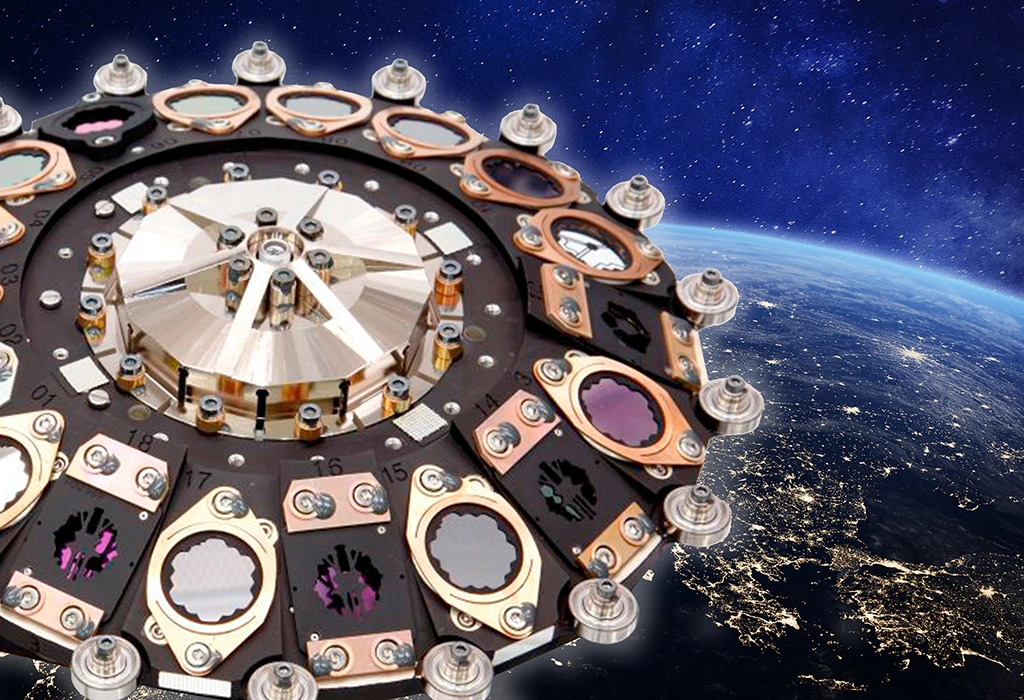HENSOLDT Optronics supplies technological heart of the "James Webb" space telescope

Oberkochen/Germany, 22 December 2021 – The "James Webb" space telescope will replace the successful "Hubble" telescope as the leading observation instrument in space in the coming months. Thanks to its 6.5m large primary mirror, the new observatory has a much higher sensitivity compared to "Hubble". The spectral resolution of its instruments allows the analysis of the formation history up to the chemical composition of the observed celestial bodies. Now the launch is imminent.
The space observatory has four scientific instruments on board. Two of the instruments, MIRI and NIRSpec, were developed and built in Europe. HENSOLDT Optronics and the Max Planck Institute for Astronomy Heidelberg (MPIA) made key contributions to both instruments with the cryomechanisms and spectrally splitting optics manufactured at HENSOLDT.
HENSOLDT's optical filter and grating wheel mechanisms allow the instruments to be configured precisely and reliably for different types of observations. MPIA was instrumental in their development and testing. For HENSOLDT Optronics and MPIA, the contribution to "James Webb" was a milestone in the successful collaboration in the development of increasingly powerful optical observing instruments.
The demands on the telescope and its instruments are immense. After a launch load of many times the acceleration due to gravity, the instruments are cooled in space to near absolute temperature zero (-273° C). After the telescope is deployed at its destination, the telescope's primary mirror and its astronomical instruments will be aligned with the highest precision over a period of about six months. The observatory will then enable scientists to observe galaxies several billion light years away with the highest resolution.
The most important scientific goal of this mission is to study the "first light" that reaches us from the early universe and will allow conclusions to be drawn about the formation of the first stars, galaxies and planets in the universe. The observations will also provide insights into the formation of stars and planets in our Milky Way.
The James Webb Space Telescope (JWST) will be positioned about 1.5 million kilometres from Earth and will orbit the Sun synchronously with Earth. This position in space allows particularly favourable conditions for high-resolution observation in the infrared wavelength range, which is crucial for this mission.
With a decisive contribution to the JWST, HENSOLDT Optronics demonstrates its capability as a state-of-the-art European technology centre in terms of design, development, production and testing of space optronics and electronics solutions. Its heritage in the space business dates back to the moon landing and Apollo 11. Since then, the Ostalb-based company has successfully participated in Earth observation missions and surveys of the icy moons of Mercury and Jupiter, among others. The company's Active Electronic Ally Scanned Array (AESA) radars have been used effectively in observation missions for more than twenty years. These capabilities are complemented by the HENSOLDT Space Consultancy, which advises space agencies such as the French CNES, the European ESA and the American NASA on mission implementation.
About HENSOLDT
HENSOLDT is a German champion in the defence industry with a leading market position in Europe and a global reach. Headquartered in Taufkirchen near Munich/Germany, the company develops sensor solutions for defence and security applications. As a technology leader, HENSOLDT also continuously expands its Cyber portfolio and develops new products to combat a wide range of threats based on innovative approaches to data management, robotics and cybersecurity. With more than 5,600 employees, HENSOLDT generated revenues of 1.2 billion euros in 2020. HENSOLDT is listed on the Frankfurt Stock Exchange and the SDAX stock market index there.
Press contact
Alexander Ogger
Tel.: +49 (0) 7364.9557-984
alexander.ogger@hensoldt.net
Latest news
Sustainability Report 2024: HENSOLDT focuses on responsible growth
The HENSOLDT Group (“HENSOLDT”) has published its Sustainability Report for the 2024 financial year, providing detailed insights into its progress in the areas of environmental, social and responsible corporate governance. For the first time, the sustainability report is fully integrated into the annual report to emphasise the equivalence of financial and non-financial reporting. In doing so, the company is sending a clear signal of transparency to its stakeholders.
